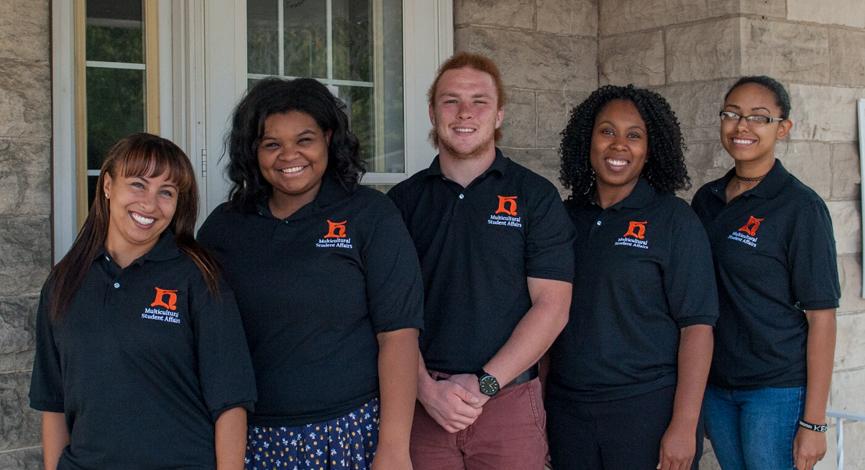
The development of a Multicultural Student Affairs Office to provide a safe, supportive environment for students with marginalized identities has been a while in the making. But with last spring’s hiring of Cherrelle Gardner to direct the efforts, things are moving very quickly.
According to Cherrelle, students are very excited and providing great energy and ideas. “I’m very interested to see what this office can mean and what it will turn into,” she says.
“Everyone’s been very supportive of having a very diverse student body,” Cherrelle says. “We’re working on figuring out the inclusivity part. We have them (students of color) here. Now, how do we make sure they are included and supported?”
The answers to that question are starting to unfold with two key initiatives and revival and launching of new student organizations this semester.
Already, marginalized students are beginning to feel they have a voice.
“Having Cherrelle here makes a profound difference in me feeling heard, that my experiences are validated,” says Enya Granados, a senior biology and education major from Columbus. “She’s been so responsive to my needs. She listens to my stories and my struggles. It’s such a sense of relief to go to an office that’s specifically for my needs.”
All rise for RISE
It’s not unusual for students of color, during their first or second year, to leave school for a variety of reasons. “A lot of the challenges they face are social and cultural,” Cherrelle says. That’s where RISE comes in as a support mechanism for these students. RISE, which stands for Reaffirming Identity through Scholarly Enrichment, was launched this semester as one of her two key initiatives for this year. RISE aims to build co-ethnic groups of students with similar backgrounds and experiences who come together to support one another.
“If a situation arises, the students will have a community where they feel safe and that can support them,” Cherrelle says.
Through RISE Fridays, activities, workshops and discussions are offered on relevant academic and out-of-class topics, all toward a goal of building a community. Waiting in the wings to help are RISE Champions – faculty and staff members who are serving as resources who students can reach to in challenging situations.
Upperclass students of color – like senior student-athlete Terrance Cole of Toledo – are serving as RISE mentors to first- and second-year students. “It’s cool,” Terrance says. “I never experienced anything like this. It’s a good opportunity. Freshmen students who are from places like I am sometimes just need some guidance.
“We want to keep them above water with grades and just doing the right thing.”
A house to call home
Ubuntu Black Cultural House – the second key initiative – is another new resource for students of color. This semester, five students live on the second floor of the campus-owned house and together, they are responsible for creating programming twice each month.
The first floor of Ubuntu House is open during set hours for students to study, catch lunch or just hang out. “We hope it will be a living learning resource center,” Cherrelle says.
In partnership with Black Student Union, “Welcome Back Kick Back” was the first event of the semester. The group offered food and music in its effort to gather interest.
The bonds of student organizations
Terrance was one of the drivers of Black Student Union’s return to campus last semester. “I thought if I could mold something here, make it fun, it would help make everyone feel comfortable and break the racial tension,” he says. All students are invited to participate with BSU; it’s a great way to stay active and engaged, and meet people different than you.
“The Heidelberg campus … you can’t just sit around. You have to find a group or activity to keep you busy. You can’t be just a student. You have to be involved,” Terrance says.
With its mission to provide social and educational programming about African American identity, Black Student Union is back this year, and getting stronger. The group meets every Friday and is planning to host a series of events throughout the school year.
Berg Equality (formerly Berg Allies) has been renamed and re-energized as a student organization that focuses on social justice and advocacy and support of all marginalized groups.
New to campus is Berg Latinx Unidos, which Enya created. “I wanted a space where I can be with other Latinos to talk about things we face, good or bad, and support each other,” she explains. Latinx has three goals: create a space for support, celebrate their culture, and make connections with alumni and the community.
Changing campus culture
Although Heidelberg’s student body is becoming more diverse – this year, 25 percent of the members of the freshman class are students of color – its makeup is still predominantly white. A lot of small, subtle things add up and can cause extra stresses in the lives of marginalized students, and for some, could impact whether they’re able to stay in school.
Those types of stresses – financial hardship, unexpected family situations, for example – are not only distracting, they have the potential to create barriers, Enya believes. After feeling like she was not understood when her step-father was taken by Immigration and Customs Enforcement last year, she says, “That's why this group is needed.” And that’s why she’s so excited to provide leadership to the new Multicultural Student Affairs Office.
Students have high hopes for the office and its programs, now and going forward.
“I hope that minorities feel like we have a place of support in many aspects of our lives,” Terrance says. Enya adds, “I also hope we can bring awareness to the whole campus about our problems, our experiences, the barriers we face, but also the awesomeness of our cultures.”